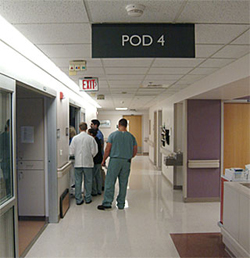Program Overview

Upon completing your surgery resident training at Henry Ford Hospital, it is expected that you will be able to provide medical and surgical care to your patients in a competent, safe and professional manner throughout your health care career. We believe that this endpoint can best be achieved by exposing you to educational opportunities that will promote growth and maturation of your individual skills as a physician and surgeon, as well as your ability to work within the framework of a health care team.
As you assume your role as a physician, you will bring with you a scientific database accrued during your earlier years of medical training. This knowledge will be dramatically altered during the early course of your residency training; all residents will develop a fundamental knowledge base of surgery through self-directed reading program that will be enhanced by participation in departmental conference and a scholarly pursuit of research endeavors. You will learn to use this knowledge base to develop your clinical problemsolving skills through daily patient care interactions. Through self-directed reading with computer-based medical information systems, you will broaden your practice skills by employing evidence-based practice guidelines that help you to gain insight from your patient care outcomes. This facet of your education will be continually reinforced during formal and informal teaching sessions that focus primarily upon a critical analysis of these patient management decisions. The distillation of these processes is to develop a sound, reasoned clinical acumen that will serve you well not only in the present, but well into the future. To do so will require that we afford you opportunities in which to develop the ability to adhere to the process of unbiased and ethical self-critique of your patient care interactions, with the belief that the disciplines of medicine and surgery are life-long learning processes.
Into the skills of a physician you must blend those of a surgeon. Foremost, this requires that you develop facility with the processes of making decisions relative to the indications and timing of a given operative procedure; planning the conduct of an operation; and intraoperative decision-making. To that end, you will be accorded an increased level of participation in these operating room privileges in concert with the technical skills you bring to the table and with your demonstrable understanding of the proper conduct of a given procedure. In addition, you will be asked to master the skills needed for effective perioperative management of your patients. Among the specific goals of this process is to develop a sense of "trajectory" in your practice. This is to say, you will learn that recovery from a given illness or operative procedure can be patterned along a fairly, unique time-course curve, along which certain clinical events should occur with regularity as the patient recuperates. Deviation from an expected trajectory path should be considered a potentially ominous sign that an untoward event lies ahead for the patient unless measures are taken to bring the patient back onto the proper course. You will be given opportunities to hone your clinical skills, and to obtain ancillary tests only when you believe that the results of these examinations will appreciably alter the manner in which you are managing your patient. To do so mandates belief in the concept that continuity of health care delivery is paramount. In the aggregate, we believe that adherence to these principles will result in the delivery of quality, efficient surgical care to your patients.
Perhaps foremost among all the medical disciplines, it is critically important for the surgeon to display the skills needed to convey your observations, your contemplated operative procedures, and your outcomes to your patients and their support system in a manner that leaves them with a clear understanding of their situation. You will learn to be an attentive listener, to speak with even-temper and demeanor. Your patients are placing their very bodies in your hands, a most daunting responsibility, and it is your task to make this transfer as seamless a process as possible, using an empathetic manner and impeccable communication. Your ability to carry out this facet of your role as a surgeon and physician will require an enormous investment to complete the task of maturing your interpersonal skills.
to convey your observations, your contemplated operative procedures, and your outcomes to your patients and their support system in a manner that leaves them with a clear understanding of their situation. You will learn to be an attentive listener, to speak with even-temper and demeanor. Your patients are placing their very bodies in your hands, a most daunting responsibility, and it is your task to make this transfer as seamless a process as possible, using an empathetic manner and impeccable communication. Your ability to carry out this facet of your role as a surgeon and physician will require an enormous investment to complete the task of maturing your interpersonal skills.
Finally, your skills as an individual physician and surgeon will be best applied when fostered within an environment that stresses the importance of teamwork in the providing of health care. It is essential that you develop the ability to effectively pass knowledge to your surgical and medical colleagues and to others of the health care team, including medical students and ancillary personnel. The sum of your labors is to be able to present yourself as a professional, a surgeon with the level of fiber and personal ethic that leaves no doubt in the minds of others that you are the foremost patient advocate. The success with which you achieve each of these goals will define your ability to deliver high quality and compassionate care to your patients.
.svg?iar=0&hash=F6049510E33E4E6D8196C26CCC0A64A4)
/hfh-logo-main--white.svg?iar=0&hash=ED491CBFADFB7670FAE94559C98D7798)